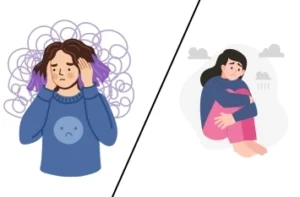
How To Convince Someone To Go To Therapy: A Psychiatrist Insights
How To Convince Someone To Go To Therapy In a world that often demands constant productivity and resilience, the importance of mental well-being cannot be

Laziness VS Depression | |
A choice or behavior | A mental health disorder |
Can be overcome through changes in habits and behaviors | Requires proper diagnosis and treatment by a mental health professional |
May be a symptom of underlying issues such as depression or anxiety | Often the primary reason for struggles with daily tasks and responsibilities |
Does not usually cause physical symptoms | Can have physical symptoms, such as changes in appetite and sleep patterns |
Not a constant state; can fluctuate depending on the situation or task | A persistent feeling that affects daily life |
Often seen as a character flaw or personality trait | Recognized as a medical condition |
Can be addressed and improved with self-awareness and effort | Requires professional help and support from loved ones |
Can vary in severity | Can range from mild to severe |
May lead to feelings of guilt or self-criticism | May cause feelings of hopelessness and worthlessness |
Practice self-awareness: Start by recognizing your patterns of behavior and emotions. This will help you identify whether you’re experiencing laziness or if it’s a symptom of depression.
Seek professional help: If you suspect that your lack of motivation and difficulty completing tasks may be due to depression, it’s important to seek help from a mental health professional. They can provide you with an accurate diagnosis and develop a treatment plan tailored to your needs.
Make small changes: Whether you’re struggling with laziness or depression, making small changes in your daily habits and routines can help improve your mood and motivation. Set achievable goals, practice self-care, and be patient with yourself.
Reach out for support: Don’t be afraid to talk to loved ones about what you’re going through. Having a strong support system can make a big difference in overcoming laziness or depression.

How To Convince Someone To Go To Therapy In a world that often demands constant productivity and resilience, the importance of mental well-being cannot be

How Can SPRAVATO® Help Me? If you’re battling treatment-resistant depression (TRD) or major depressive disorder (MDD) with suicidal thoughts, finding effective relief can feel overwhelming.

Anxiety vs. Depression: What’s the Difference and Can You Have Both? Anxiety and depression are two of the most common mental health conditions, affecting millions
